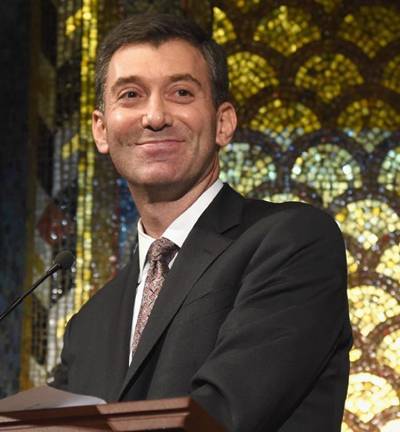Rabbi Joshua Davidson Steers Temple Emanu-El Through Changing Times
Rabbi who has headed the Upper East Side Reform synagogue Temple Emanu-El for a decade grew up in Great Neck, Long Island and followed his father into the clergy, but followed his own path to a religious calling.

Ten years into his tenure as senior rabbi of Temple Emanu-El, New York City’s first Reform Jewish congregation dating back to the mid-nineteenth century, and now one of the world’s largest synagogues, Rabbi Joshua M. Davidson speaks warmly of the “special family” of people that he feels very grateful to be serving.
“It has been just an extraordinary decade here for me,” Davidson said while seated in the hushed calm of the magnificent work of art that is the main sanctuary located at East 65th Street and Fifth Avenue on the Upper East Side. “I’ve been blessed with a wonderful group of colleagues and lay leadership who are so talented and committed.”
It is the opportunity to have a meaningful impact on the lives of members of his congregation that inspires his life of service. “I became a Rabbi because there is nothing more powerful than being present for people at moments in their lives when your presence can make a difference,” he said. “Whether that is in moments of celebration, or moments of challenge, it is a privilege to enter people’s lives and try to help them find blessings where it can be found.”
Davidson grew up in Great Neck, on Long Island, in a home immersed in Jewish traditions. His father Rabbi Jerome K. Davidson was the senior rabbi of Temple Beth-El of Great Neck for more than 40 years and a significant influence in his decision to enter the rabbinate as well. His mother Dr. Gail S. Davidson, a professor of art history and curator, was equally supportive of his decision.
It was not an immediate choice as a career path, however. He went off to college at Princeton, earning a degree in English and exploring other interests after graduation before finally enrolling in the Hebrew Union College -Jewish Institute of Religion. He spent the first year of this master’s program living and studying in Jerusalem in the early 90’s.
From student pulpits while at Hebrew Union, to senior rabbi at Temple Beth El in Chappaqua in northern Westchester starting in 2002 for 11 years, Davidson has been a devoted leader to the Jewish community for many years, well known for his support of social justice causes, and interfaith dialogue throughout the city and country. In 2013, on receiving the appointment to lead the congregation at Temple Emanu-El, he returned to Manhattan on the Upper East Side with his family, his wife Mia Fram Davidson, a cantor and Jewish clergy who is also involved in chaplaincy work, and their two young daughters.
From the beginning as senior rabbi, he had a vision of what he hoped to contribute to the celebrated legacy of one of the nation’s most influential Reform congregation. “My aspiration from when I arrived was to attempt to open new doorways to Jewish life,” Davidson said, “[and] I’m very excited about what Temple Emanu-El has been able to accomplish over the last ten years.”
These new doorways include an expansion last year to a new campus in Chelsea, Emanu-El Downtown, with special events and educational programs for families with young children “because you have to be willing to actually go and meet people where they are.” And at the main campus, creating programming for young professionals in their 20s and 30s in an attempt to “keep them tethered to Jewish life,” among the many new offerings now available to the community.
A few floors up from the sanctuary is the Bernard Museum of Judaica where Davidson gave a tour of the one-of-a-kind current exhibition, Violins of Hope. “These violins were, many of them, played by inmates in the Nazi concentration camps,” he said. “At a time when fewer and fewer survivors remain, we have to continue to find compelling ways to keep the reality of the Holocaust alive–exhibitions like this help us to do that.” And if one stands still enough, the instruments seem to play softly in unison, a sound of hope, survival–and vigilance.
“Whether that is in moments of celebration, or moments of challenge, it is a privilege to enter people’s lives and try to help them find blessings where it can be found.” Rabbi Joshua M. Davidson, Temple Emanu-El